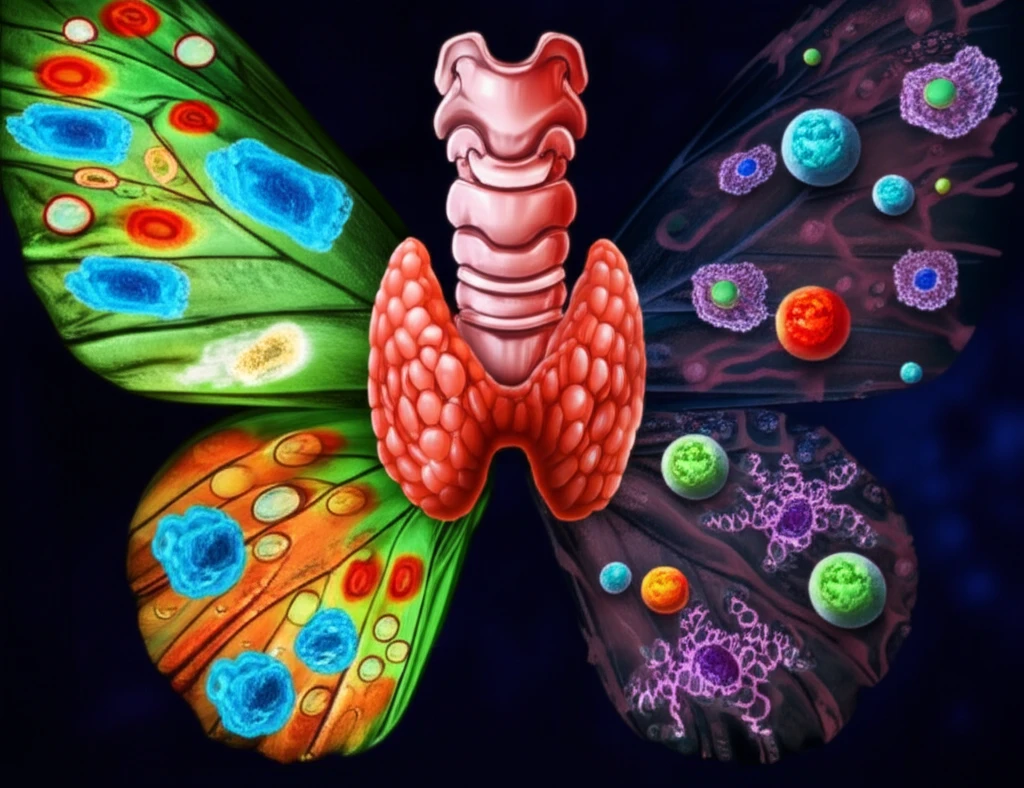
Decoding Thyroid Cancer: Understanding How Hormones Impact Women's Health
"New research sheds light on the connection between estrogen, progesterone, and thyroid cancer, offering hope and insights for women."
Thyroid cancer, a condition that affects millions worldwide, has seen a surge in attention, especially concerning its impact on women. This form of cancer, originating in the butterfly-shaped thyroid gland, is more prevalent in women than men. Recent studies are uncovering intricate links between hormonal influences, particularly estrogen and progesterone, and the development and progression of this disease. Understanding these connections is crucial for improved diagnosis, treatment, and, ultimately, better outcomes.
The thyroid gland plays a vital role in regulating metabolism, growth, and development. Thyroid cancer can disrupt these functions, leading to various health challenges. While numerous factors contribute to its development, the role of hormones, specifically estrogen and progesterone, has emerged as a key area of interest. These hormones, integral to women's reproductive health, are now being studied for their potential influence on thyroid cancer.
This article explores the latest research on the relationship between thyroid cancer and these hormones. We'll examine how estrogen and progesterone interact with cancer cells, the implications of these interactions, and what these findings could mean for the future of thyroid cancer treatment and prevention. Our goal is to provide you with a clear, accessible understanding of this complex topic, empowering you with knowledge about your health.
Unraveling the Connection: Estrogen, Progesterone, and Thyroid Cancer

Recent research has highlighted the significant roles that estrogen and progesterone receptors play in thyroid cancer cells. These receptors, found on the surface of cells, act as docking stations for hormones. When hormones bind to these receptors, they can trigger various cellular processes, including cell growth and division. The presence of these receptors in thyroid cancer cells suggests that hormonal influences could significantly impact the disease.
- Estrogen's Role: Estrogen may promote the growth and spread of cancer cells.
- Progesterone's Role: Progesterone's effects are still being studied, but it appears to interact with estrogen in complex ways.
- Metastasis: The increased estrogen receptor expression in metastatic cases suggests a possible link between estrogen and cancer spread.
Looking Ahead: Implications and Future Directions
The insights into the roles of estrogen and progesterone in thyroid cancer pave the way for innovative therapeutic approaches. Future research will focus on developing hormone-based therapies that target these receptors, potentially slowing or even reversing the progression of the disease. Additionally, a deeper understanding of the interactions between hormones, inflammation, and the immune system could lead to more personalized and effective treatment plans. The journey towards better thyroid cancer care is ongoing, and these recent findings represent a significant step forward in empowering patients and improving outcomes. This research underscores the importance of staying informed, proactive health management, and the endless potential of medical breakthroughs.
